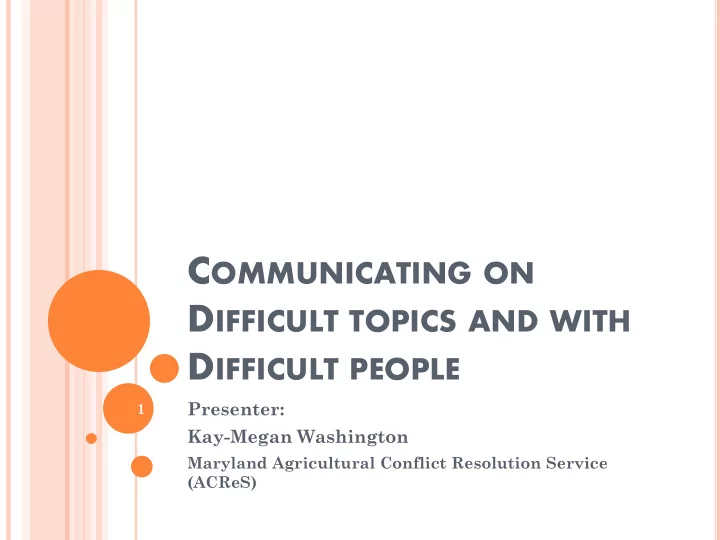

C OMMUNICATING ON D IFFICULT TOPICS AND WITH D IFFICULT PEOPLE Presenter: 1 Kay-Megan Washington Maryland Agricultural Conflict Resolution Service (ACReS)
R OADMAP FOR T ODAY ’ S P RESENTATION What is conflict? Communication skills Tips to make discussions easier 2
W HAT IS CONFLICT ? 3
C ONFLICT S TYLES Accommodate Avoid Compete Compromise Collaborate Determining the appropriate method to apply in a particular situation can result in the best possible solution. 4
HIGH Accommodate Collaborate I lose, you win I win, you win C ONFLICT M ANAGEMENT S TYLES - Some styles focus more on the importance of the relationship Compromise We both win, we both Importance - Some styles focus of lose on the importance Relation- ship of the outcome - Which style do you identify with? - Just as important, which style does Compete the person you’re Avoid I win, you lose dealing with seem I lose, you lose to identify with? LOW 5 < LOW ---------------- Importance of Outcome --------------- HIGH >
S OURCES OF C ONFLICT There are a lot of sources of conflict, but most boil down to lack of knowledge and poor communication. Differences over: Money Information Interests/Goals Relationships Values Cultural Norms Personality types 6
T HE C YCLE OF C ONFLICT Stressful Incident The Other Person’s Your Feelings Responses Your Observable Behavior 7
COMMUNICATION SKILLS 8
1. D ETERMINE WHAT KIND OF IMPRESSION YOU MAKE ON OTHERS 15 Essential People Skills: Which ones have you mastered? Genuine 1. Which ones are you Patient 2. skilled at? Empathetic 3. Polite Which ones do you 4. Respectful 5. struggle with? Trustworthy 6. Which ones are Good listener 7. missing? Flexible 8. Positive 9. Open-minded 10. Articulate 11. Honest 12. Self-Aware 13. Good-humored 14. 9 Other-focused 15.
Q UESTIONS TO ASK YOURSELF WHEN COMMUNICATING WITH OTHERS Passive What do I want? Aggressive What do they want? (If I Assertive don’t know, how can I find out?) What will get me what I want? What’s my HOOK? What are the likely outcomes to my asking for what I want? Of my getting what I want? 10
2. R EALLY L ISTEN TO WHAT OTHERS HAVE TO SAY ( AND LET THEM KNOW YOU ’ RE LISTENING How often do messages change in everyday life? When people are really paying attention to you, how do you know? 11
What are some reasons you might not give your full attention to a speaker? Think of someone who you think is a “good” communicator. What are things this person did well? What were skills you valued in this person? 12
N ON -V ERBAL C OMMUNICATION Behavior + Words = Interpretation 55% Facial expression, gestures, posture 38% Tone of voice, inflection 7% Words - From Silent Messages , Dr. Albert Mehrabian 13
A CTIVE L ISTENING Acknowledge feelings Repeat statements/clarify Ask exploratory questions/ open-ended questions Identify what the person wants Respond with empathy when appropriate Clarify with more neutral, less confrontational language 14
BLOCKS TO ACTIVE LISTENING Defensiveness Judging Bias from your own Threatening opinions, beliefs or Diagnosing experiences Ordering 15
L ET ’ S S EE W HAT W E C OVERED … Skills for What is conflict? communicating Words we associate Non-verbal with conflict communications How we can look at Active listening conflict differently Recognizing blocks to Styles we use to deal active listening with conflict Sources of conflict Cycle of conflict 16
T IPS TO MAKE COMMUNICATING EASIER 17
D ON ’ T DELAY DIFFICULT CONVERSATIONS 5/12/2017 Set up/schedule a time to talk. Ask yourself the questions from the last section (What do you want? What do you think they want?) Introduce the subject straightforwardly (e.g., “Your dad and I have been thinking about what we’d like to have happen to the farm after we’re gone, and we’d like to hear your ideas.”) Identify the other person’s feelings and values around what you want to talk about. (Feelings = anger, happiness, fear; Values= independence, reliability, tradition, flexibility) 18
U SE R EFLECTIVE L ISTENING This type of listening involves two key steps: (1) working to understand a speaker's idea, then (2) offering the idea back to the speaker, to confirm the idea has been understood correctly. Check in. For example, “I think you’re saying that you’re sad to think Dad and I won’t always be here, and being someone we can count on is really important to you. Is that right?” 19
A SK O PEN -E NDED Q UESTIONS These generally require more than a yes or no answer. Open invitation for someone to begin expressing his or her feelings, thoughts and concerns more fully Here, we are trying to o pen the conversation Think of the difference between “You think I’m crazy, don’t you?” and “I can’t read your face. What do you think about what I just said?” 20
W HAT WE C OVERED T ODAY What is conflict? Communication skills Tips on how to make communication easier 21
W HAT WE H OPE YOU W ALK A WAY WITH … Not all conflict is bad! Messages can change. Listening takes work. Communicating clearly helps in all areas of your life and helps get you what you want. Figuring out what your conflict management style can help. Practice, practice, practice! 22
H AVE QUESTIONS OR NEED HELP COMMUNICATING ABOUT DIFFICULT TOPICS RELATED TO YOUR FARM ? Call the Agricultural Conflict Resolution Service (ACReS) at 410-841-5778 or email me at kay- megan.washington1@maryland.gov. 23
Recommend
More recommend